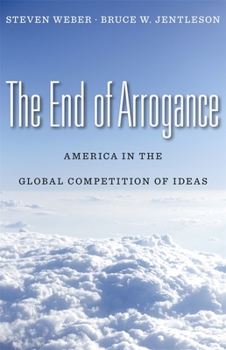The End of Arrogance: America in the Global Competition of Ideas
Select Format
Select Condition 
Book Overview
Free-market capitalism, hegemony, Western culture, peace, and democracy--the ideas that shaped world politics in the twentieth century and underpinned American foreign policy--have lost a good deal of their strength. Authority is now more contested and power more diffuse. Hegemony (benign or otherwise) is no longer a choice, not for the United States, for China, or for anyone else.
Steven Weber and Bruce Jentleson are not declinists, but they argue that the United States must take a different stance toward the rest of the world in this, the twenty-first century. Now that we can't dominate others, we must rely on strategy, making trade-offs and focusing our efforts. And they do not mean military strategy, such as "the global war on terror." Rather, we must compete in the global marketplace of ideas--with state-directed capitalism, with charismatic authoritarian leaders, with jihadism. In politics, ideas and influence are now critical currency.
At the core of our efforts must be a new conception of the world order based on mutuality, and of a just society that inspires and embraces people around the world.





